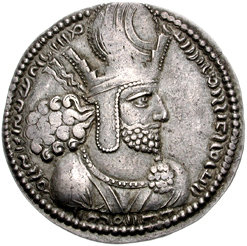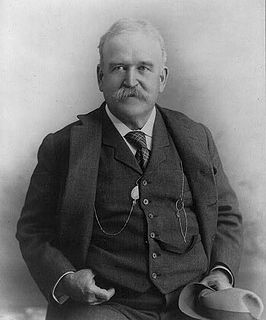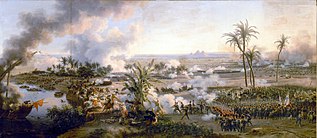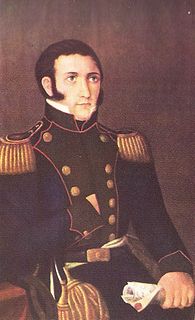
Ares is the Greek god of war. He is one of the Twelve Olympians, the son of Zeus and Hera. In Greek literature, he often represents the physical or violent and untamed aspect of war, in contrast to his sister, the armored Athena, whose functions as a goddess of intelligence include military strategy and generalship.

Gallienus, also known as Gallien, was Roman Emperor with his father Valerian from 22 October 253 to spring 260 and alone from spring 260 to September 268. He ruled during the Crisis of the Third Century that nearly caused the collapse of the empire. While he won a number of military victories, he was unable to prevent the secession of important provinces. His 15-year reign was the longest since the 19-year rule of Caracalla.

Tacitus was Roman Emperor from 275 to 276. During his short reign he campaigned against the Goths and the Heruli, for which he received the title Gothicus Maximus.

The 1948 United States presidential election was the 41st quadrennial presidential election. It was held on Tuesday, November 2, 1948. Incumbent President Harry S. Truman, the Democratic nominee, defeated Republican Governor Thomas E. Dewey. Truman's victory is considered to be one of the greatest election upsets in American history.

Shapur I, also known as Shapur the Great, was the second shahanshah of the Sasanian Empire. The dates of his reign are commonly given as 240/42 – 270, but it is likely that he also reigned as co-regent prior to his father's death in 242.

John Davis Long was an American lawyer, politician, and writer from Massachusetts. He was the 32nd Governor of Massachusetts, serving from 1880 to 1883. He later served as the Secretary of the Navy from 1897 to 1902, a period that included the primarily naval Spanish–American War.

The Battle of the Pyramids, also known as the Battle of Embabeh, was a major engagement fought on 21st July 1798 during the French Invasion of Egypt. The French army, under Napoleon Bonaparte, scored a decisive victory against the forces of the local Mamluk rulers, wiping out almost the entire Egyptian army. It was the battle where Napoleon employed one of his significant contributions to military tactics, the divisional square. Actually a rectangle, the deployment of the French brigades into these massive formations repeatedly threw back multiple cavalry charges by the Egyptians.

The Roman province of Asia or Asiana, in Byzantine times called Phrygia, was an administrative unit added to the late Republic. It was a Senatorial province governed by a proconsul. The arrangement was unchanged in the reorganization of the Roman Empire in 211.

In ancient Roman religion, a votum, plural vota, is a vow or promise made to a deity. The word comes from the past participle of the Latin verb voveo, vovere, "vow, promise". As the result of this verbal action, a votum is also that which fulfills a vow, that is, the thing promised, such as offerings, a statue, or even a temple building. The votum is thus an aspect of the contractual nature of Roman religion, a bargaining expressed by do ut des, "I give that you might give."

Amda Seyon I was Emperor of Ethiopia, and a member of the Solomonic dynasty. According to the British expert on Ethiopia, Edward Ullendorff, "Amde Tseyon was one of the most outstanding Ethiopian kings of any age and a singular figure dominating the Horn of Africa in the fourteenth century." His conquests of Muslim borderlands greatly expanded Ethiopian territory and power in the region, maintained for centuries after his death. Amda Seyon asserted the strength of the newly (1270) installed Solomonic dynasty and therefore legitimized it. These expansions further provided for the spread of Christianity to frontier areas, sparking a long era of proselytization, Christianization, and integration of previously peripheral areas.

Syria was an early Roman province, annexed to the Roman Republic in 64 BC by Pompey in the Third Mithridatic War, following the defeat of Armenian King Tigranes the Great. Following the partition of the Herodian Kingdom into tetrarchies in 6 AD, it was gradually absorbed into Roman provinces, with Roman Syria annexing Iturea and Trachonitis.

The Battle of Gembloux took place at Gembloux, near Namur, Low Countries, between the Spanish forces led by Don John of Austria, Governor-General of the Spanish Netherlands, and a rebel army composed of Dutch, Flemish, English, Scottish, German, French and Walloon soldiers under Antoine de Goignies, during the Eighty Years' War and the Anglo-Spanish War (1585–1604). On 31 January 1578 the Spanish cavalry commanded by John's nephew, Don Alexander Farnese, Prince of Parma, after pushing back the Netherlandish cavalry, attacked the Netherlandish army, causing an enormous panic amongst the rebel troops. The result was a crushing victory for the Spanish forces. The battle hastened the disintegration of the unity of the rebel provinces, and meant the end of the Union of Brussels.

Manuel Dorrego was an Argentine statesman and soldier. He was governor of Buenos Aires in 1820, and then again from 1827 to 1828.

Vishnuvardhana was a king of the Hoysala Empire in what is today the modern state of Karnataka, India. He ascended the Hoysala throne after the death of his elder brother Veera Ballala I in c.1108. Originally a follower of Jainism and known as Bitti Deva, he came under the influence of the Hindu philosopher Ramanujacharya, converted to Hindu Vaishnavism and took the name "Vishnuvardhana". Vishnuvardhana took the first steps in creating an independent Hoysala Empire in South India through a series of battles against his overlord, the Western Chalukya King Vikramaditya VI, and the Chola Empire to the south. He recovered parts of Gangavadi province from the hegemony of the Cholas in the battle of Talakad, and parts of Nolambavdi. According to historian Coelho, the Hoysalas gained the dignity of a kingdom due to the efforts of Vishnuvardhana, whose rule was packed with "glorious" military campaigns. According to historians Sen, Chopra et al., and Sastri, Vishnuvardhana was a "great soldier" and an "ambitious monarch".
Nijaguna Shivayogi was an Indian poet and a prolific writer in the Kannada language. He lived in the 15th century. He was a follower of the Veerashaiva faith, which he attempted to reconcile with the Advaita Hinduism of Adi Shankaracharya. Tradition has it that Shivayogi was a petty chieftain of Kollegal taluk in modern Mysore district of Karnataka state, India. Considered a visionary of his time, his Vivekachintamani, written in encyclopaedic proportions and in prose style, and the Kaivalya Paddhati, a musical treatise consisting of songs are considered his most enduring works.

Gopala Dasa (1721–1769) was a prominent 18th-century Kannada language poet and saint belonging to the Haridasa tradition. With other contemporary Haridasas such as Vijaya Dasa and Jagannatha Dasa, Gopala Dasa propagated the Dvaita philosophy of Madhvacharya in South India through Kirtans known as Dasara Padagalu with the pen-name "Gopala Vittala".

The Siege of Brussels took place between January and February 1746 during the War of the Austrian Succession. A French army under the overall command of Maurice de Saxe, in a bold and innovative winter campaign besieged and captured the city of Brussels, which was then the capital of the Austrian Netherlands, from its Austrian garrison.
The last two Gujarat Sultans, Ahmad Shah III and Mahmud Shah III, were raised to throne when they were young so the nobles were ruling the Sultanate. The nobles divided territories between themselves but soon started fighting between themselves for supremacy. One noble invited the Mughal emperor Akbar to intervene in 1572 which resulted in the conquest of Gujarat by 1573 and Gujarat becoming the province of the Mughal Empire.



















